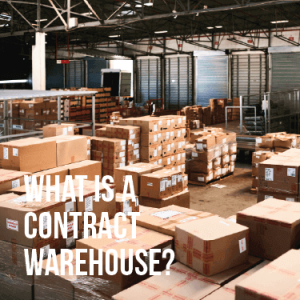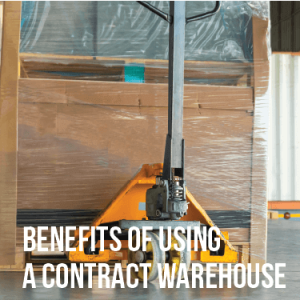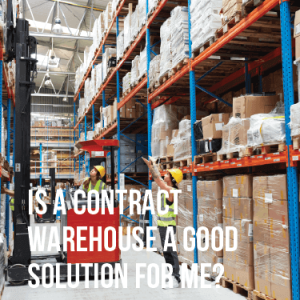
 Copy URL to Clipboard
Copy URL to Clipboard
Contract warehousing has become a go-to solution for businesses requiring dedicated storage space with the ability to provide fulfillment and distribution services. While there are a variety of warehousing options available, most others alternatives either cost too much or lack the necessary value-added services.
Contract warehousing is an agreement between a client and third-party logistics (3PL) provider to handle storage, fulfillment and distribution services on the client’s behalf. The length of a warehouse contract typically ranges from two to five years and the price is negotiated at either a fixed rate or a costs-plus model.
Our complete guide below provides you with everything you need to know about contract warehousing and whether or not it’s the right solution for you.

Simply put, a contract warehouse is a facility run by a 3PL partner contracted to handle warehousing operations like receiving, storage and distribution on a company’s behalf.
Contract warehousing, sometimes referred to as dedicated warehousing, is generally used in two situations:
In addition to dedicated warehouse space for storage, businesses can take advantage of value-added services, such as inventory management, kitting, pick and pack, and more.
In the case of dedicated warehousing, an entire warehouse and all of its resources are devoted to a single client. Multi-client, or shared warehousing, can also exist on a contract basis, as well as include value-added services. However, that’s typically not what’s being referred to by the term contract warehousing.
There are three primary warehousing options that companies consider when in need of storage space. Arguments can be made for and against each, but typically the choice will come down to a few factors.
Things to consider when making your warehousing decision include:
These factor will help you determine which type of warehouse is best for you.
Private warehouses are typically owned and operated by one company. The primary purpose of this type of warehouse is to store goods in a central location and provide easy access for storage and distribution.
While more convenient and better for long-term storage, private warehousing requires a large investment of capital. This applies to both the purchase (or construction) of the warehouse as well as the equipment and staff needed to maintain it. Additionally, a high degree of daily involvement is required to ensure it’s running properly.
Private warehouses are best suited for addressing long-term storage needs and for companies that want complete control of how their merchandise is managed and distributed. While there are no rental fees, it can take decades to see a return on investment as a result of the initial costs associated with private warehousing.
Public warehouses are run by third-party entities and rented out almost exclusively as storage space.
The price can vary depending on the amount of storage space required (typically measured in square feet), the amount of time the storage is needed, and the number of inbound and outbound transactions that a company makes.
While rental agreements can usually be made for any amount of time, public warehousing is best suited for companies looking for either short-term or seasonal storage. It’s worth noting that public warehouses don’t typically offer any additional services, and, oftentimes, store goods for multiple clients under the same roof.
Unlike private or public warehousing, contract warehouses offer a variety of value-added services and can be tailor-made to fit a client’s specific supply chain goals.
Some of the specialized services offered by contract warehouses include:
These services are offered in addition to dedicated warehouse storage. By outsourcing these services to a 3PL provider, companies can focus their time and money on other areas of their business.
The typical length of a contract runs between two and five years. The pay structure can usually be negotiated at either a fixed rate, a costs-plus model, or a combination of the two.
Contract warehousing will almost always be more expensive than renting, but depending on your needs, it can be well worth it to gain access to the additional services and avoid high initial investment costs.

Contract warehousing offers many benefits that other warehousing options just aren’t able to. Whether you’re looking to save money, ensure your company has dedicated warehouse space, or increase the reliability of your services, it’s hard to argue with the advantages of using a contract warehouse.
One of, if not the biggest advantages of contract warehousing is the amount of money that you’ll save, particularly in bypassing the need for large investments of capital.
The start-up costs of a new private warehouse, particularly if it has to be built from the ground up, can be cost-prohibitive for the average company. And even if that is an option, it can take decades to see the return on your investment.
According to buildingsguide.com, the average price to build a warehouse is $15 per square foot. Assuming you build a modestly-sized warehouse of 50,000 square feet, you’d be looking at a cost of $750,000 dollars at a minimum. Add in the cost of equipment, staffing, land purchases, and more, and you’re looking a significant investment of capital.
| Warehouse Size | Cost per Square Foot | Cost to Build Warehouse* |
| 50,000 square feet | $15 per sq ft | $750,000 |
Not only does building or expanding a warehouse mean expensive construction costs, but also the amount of time it would take (and we all know time is money).
Even if you plan on buying a fully constructed warehouse, you can still expect to spend a decent chunk of change not only the initial purchase, but on additional renovations and equipment installation. And both options still require you to staff the warehouse.
By using a contract warehouse, all of those issues are taken care of. A trusted 3PL can give companies instant access to a fully staffed warehouse capable of storing a variety of goods and equipped to offer services optimized to meet their supply chain goals.
A contract warehouse, as the name implies, requires that a contract be signed by all parties involved in order to do business. This distribution and fulfillment agreement, also known as a warehouse fulfillment agreement, provides a safety net for your company and its warehousing and distribution needs.
Entering into a contract agreement is in the best interest of both you and the 3PL provider running the warehouse. The contract length is agreed upon before signing, meaning that whether it’s signed for one year or for 10, both parties are locked into the agreement until the term comes to an end.
By signing a distribution and fulfillment agreement, both parties get what they want:
You know exactly what you’re getting when you sign the contract, and for many companies, that assurance can mean a lot. It will also lead to increased fulfillment optimization.
In the business of logistics and order fulfillment, reliability is key. In order to keep customer satisfaction high, goods need to be delivered as-ordered in a timely manner. And that all starts with the warehouse.
The good news is that contract warehouses employ a dedicated staff tasked with providing accurate and efficient work. And most importantly, they have the ability to handle increased demand.
Your flow of goods is not always going to remain consistent and the warehouse providers know that. As such, contract warehouses are specifically engineered to adjust and meet your current level of need, ensuring that your goods are delivered in a reliable and timely manner and that your customers remain happy.

Contract warehousing may sound like a great option in theory, but is it the best choice for you? Before making your decision, you should first determine what your needs are.
Contract warehousing is best served for companies that are looking for medium- and long-term storage options that have an interest in outsourcing logistics and order fulfillment to a 3PL provider.
If you’re busy trying to grow or maintain other areas of your business, you may not have the necessary time or resources to dedicate to the storage and distribution of your merchandise.
Contract warehousing solves that problem by providing a dedicated staff that can offer a variety of logistics solutions. You still retain control over the warehousing process, but it removes the need for daily oversight. In turn, this gives you the ability to focus your attention and resources on the areas that need them most.
Contract warehousing can also make sense if your company lacks the time or money necessary to invest in a private warehouse, or is simply looking to boost its distribution efficiency and reliability of its distribution.
Finding the right partner to address your storage concerns and help you meet your supply chain goals is crucial to growing your business. If you want to optimize cost-to-serve and keep your customers happy, hiring the right strategic partner is the first step.
Contract warehousing can provide your company safe, reliable, and cost-effective storage while providing a number of other value-added services.
Fulfillment and Distribution, powered by R+L Global Logistics, can help you do exactly that. Fill out a fulfillment warehouse quote today and see how we can help you find the right warehouse option for you.
